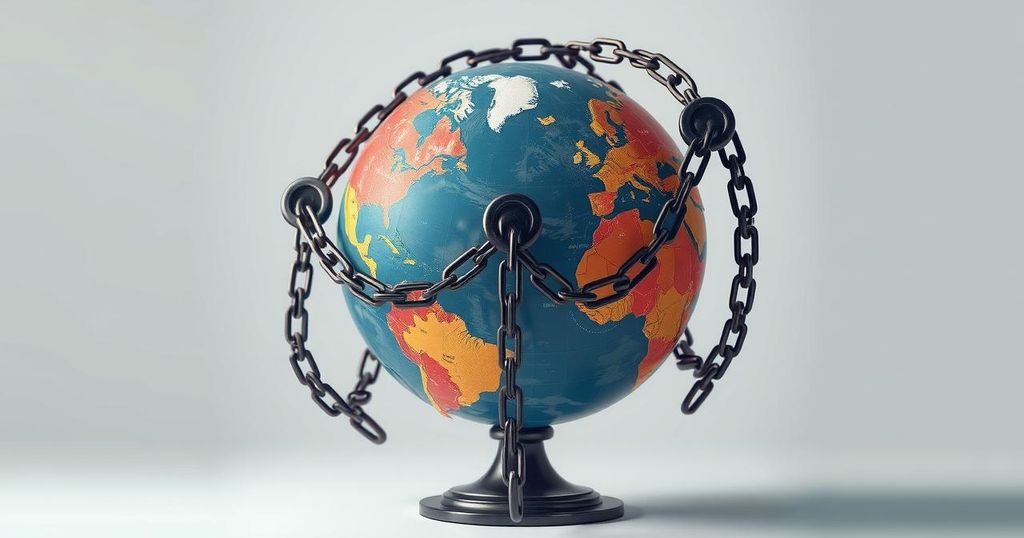The Trump administration’s proposal suggesting that Jordan and Egypt accept Palestinians from Gaza places Jordan in a vulnerable position, highlighting its dependency on U.S. aid. This situation risks provoking internal unrest and destabilizing relations, with significant implications for both Jordan and regional security.
Jordan is currently confronting significant geopolitical challenges owing to recent comments made by President Donald Trump concerning the displacement of Palestinians from Gaza. Trump’s suggestion that Jordan and Egypt accept approximately two million Palestinians has exacerbated tensions with the Hashemite Kingdom, raising concerns about the potential for geopolitical coercion against King Abdullah II. Experts warn that the Kingdom’s dependency on U.S. aid may make it susceptible to such pressures, potentially jeopardizing its stability and security.
President Trump has reiterated his proposal during public appearances, implying that Jordan and Egypt, due to U.S. support, will ultimately comply with American expectations regarding Palestinian resettlement. Analysts view this as a strategic maneuver that could incite major confrontations, especially since King Abdullah II has firmly stated that any scenario involving further Palestinian displacement is unacceptable. This stalemate could place Jordan in a precarious position regarding its relationship with the United States.
Historically, Jordan has benefitted significantly from U.S. aid, receiving approximately $1.45 billion annually, which has been critical for its economic and military stability. The Wadi Araba Treaty of 1994 established strong diplomatic relations with Israel, contributing to this foreign assistance. The recent freeze on certain foreign development programs has heightened anxiety over the potential disruption of aid, with implications for various sectors, including humanitarian and military assistance.
The potential leveraging of U.S. aid by the Trump administration may force Jordan to reassess its alliances and possibly seek assistance from new partners such as the Arab Gulf states, Russia, or China. However, such shifts may entail severe internal challenges, potentially leading to unpopular austerity measures that would exacerbate public discontent. Measures affecting military aid could directly impact Jordan’s security landscape, given the reliance on U.S. funding for defense.
Internal dissent within Jordan has been escalating due to ongoing protests against Israel’s actions in Gaza, reflecting widespread frustration regarding the government’s ties to both Israel and the United States. The Islamic Action Front has gained significant parliamentary representation, indicating growing public discontent with the monarchy and calls for a shift in policy direction. Jordan’s geopolitical significance to U.S. interests, however, suggests that aiding the Kingdom may continue to be a priority in Washington.
Experts emphasize the need for the Trump administration to reconsider its approach to the Israeli-Palestinian conflict, warning that a continued insistence on such proposals could destabilize not only Jordan but the broader region as well. The stability of both Jordan and Egypt may be jeopardized if such policies are enforced without careful consideration of their ramifications.
The historical context of Jordan’s geopolitical significance is grounded in its relationship with the United States and its role in Middle Eastern politics. Jordan has long been a strategic ally for the U.S., receiving considerable aid that supports its economy and security forces. The Palestinian refugee crisis, along with existing tensions with Israel, complicates Jordan’s domestic and foreign policy landscape, particularly as the rights and welfare of Palestinian populations remain contentious topics in regional discourse.
In summary, Jordan’s geopolitical landscape is precariously influenced by U.S. policy changes under the Trump administration regarding Palestinian resettlement. The potential for ‘geopolitical blackmail’ raises significant concerns for King Abdullah II as he navigates internal dissent and external pressures. It is crucial for U.S. policymakers to approach the Israeli-Palestinian issue with sensitivity to regional stability.
Original Source: www.aljazeera.com






